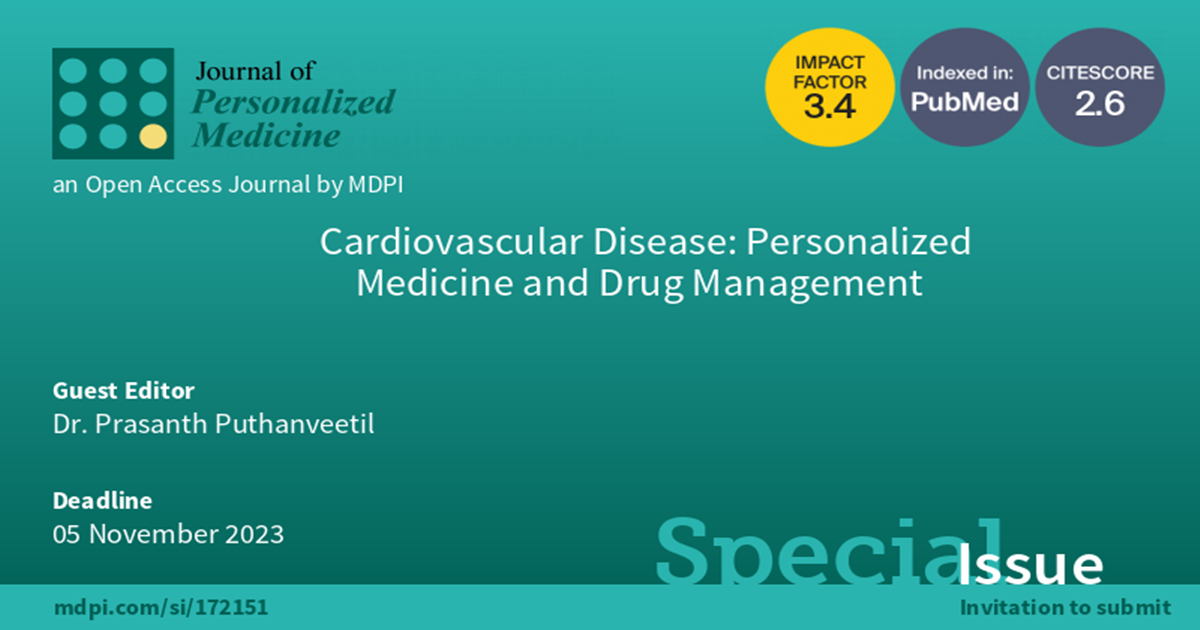Cardiovascular Disease: Personalized Medicine and Drug Management
A special issue of Journal of Personalized Medicine (ISSN 2075-4426). This special issue belongs to the section "Personalized Therapy and Drug Delivery".
Deadline for manuscript submissions: closed (5 November 2023) | Viewed by 983

Special Issue Editor
Interests: metabolism; metabolic signaling; drug targets; immunopharmacology; infections; inflammation
Special Issues, Collections and Topics in MDPI journals
Special Issue Information
Dear Colleagues,
Cardiovascular diseases (CVDs) comprise the leading cause of mortality and morbidity globally. Despite the advances we have made in therapeutics, there are so many unmet needs in the area of cardiovascular medicine for various complications. These significant limitations are due to confounding factors such as other complications and their respective treatments overlapping with ongoing cardiovascular complications and due to the unique genetic makeup of everyone.
This Special Issue aims to shed light on the issues faced by patients suffering from cardiovascular complications due to the above-mentioned complications, focusing personalized medicine and adequate drug management to avoid associated health complications. Understanding in depth the genetics and disease profiling of each patient, alongside making a conscious decision to avoid significant drug–drug interactions and drug–diet interactions, can minimize complications and aid in faster recovery.
The current series highlights state-of-the-art research, including basic, translational, and clinical work focusing on personalized medicine approaches and findings on drug management to consciously avoid errors in treating cardiovascular disease.
We are delighted to accept manuscripts of original research (including communications) and review articles, focusing on basic translational and clinical studies providing detailed information and clearly defining the role of personalized medicine and drug management in controlling cardiovascular diseases.
Dr. Prasanth Puthanveetil
Guest Editor
Manuscript Submission Information
Manuscripts should be submitted online at www.mdpi.com by registering and logging in to this website. Once you are registered, click here to go to the submission form. Manuscripts can be submitted until the deadline. All submissions that pass pre-check are peer-reviewed. Accepted papers will be published continuously in the journal (as soon as accepted) and will be listed together on the special issue website. Research articles, review articles as well as short communications are invited. For planned papers, a title and short abstract (about 100 words) can be sent to the Editorial Office for announcement on this website.
Submitted manuscripts should not have been published previously, nor be under consideration for publication elsewhere (except conference proceedings papers). All manuscripts are thoroughly refereed through a single-blind peer-review process. A guide for authors and other relevant information for submission of manuscripts is available on the Instructions for Authors page. Journal of Personalized Medicine is an international peer-reviewed open access monthly journal published by MDPI.
Please visit the Instructions for Authors page before submitting a manuscript. The Article Processing Charge (APC) for publication in this open access journal is 2600 CHF (Swiss Francs). Submitted papers should be well formatted and use good English. Authors may use MDPI's English editing service prior to publication or during author revisions.
Keywords
- cardiovascular disease
- adverse drug effects
- drug interactions
- cardiovascular pharmacology
- personalized medicine






